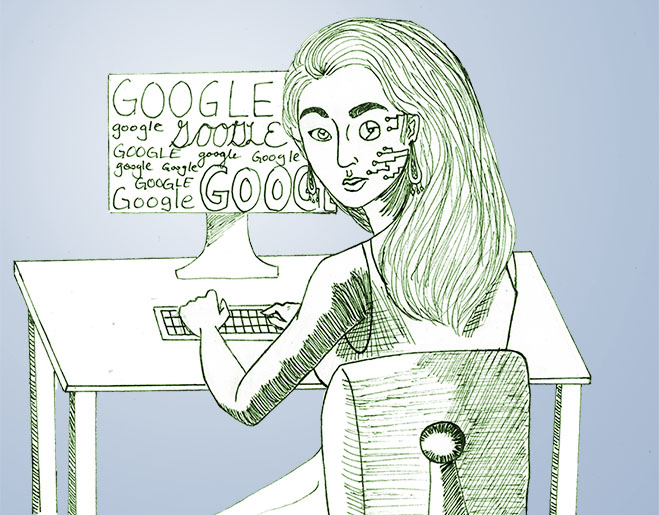

In 1998, Stanford computer science graduates Larry Page and Sergey Brin set up an office in a Menlo Park garage for their prospective search engine business. With determination and a generous donation of $100,000 from Sun co-founder Andy Bechtolsheim, the duo established their company. They named it “Google,” a play on “googol,” a number in which the digit one is followed by one hundred zeros, to reflect their dream of creating a database of seemingly infinite amounts of information. Fourteen years later, Google has established a technological empire.
Social studies teacher Jim Smith says, “Google has just gotten bigger and bigger and bigger over the years, providing all sorts of information and ways for us to do research work, production work, and create content.” Every day, google.com handles over one billion searches and about 7.2 trillion page views.
Smith says, “I think Google’s popularity has something to do with how it’s so elegant. The whole interface is very clean, it doesn’t have a bunch of ads on it and I think people found it very appealing. Then, when people actually started using it, they found it very useful.” Although Google does collect substantial revenue from advertisements, the ads are mostly off to the side in the same color scheme as the rest of the page.
Sophomore Aria Farahani says, “I like the simple layout of Google. All the other search engines give me a headache.”
However, some students believe Google’s appeal goes deeper than its attractive pages. Junior Matthew Lanthier says, “Google has a bandwagoning appeal. Everyone uses it.”
Still, Google has yet to obtain substantial popularity for some of their projects. Google+, for example, has not yet caught up to the large Facebook population. Sophomore Stephen Schick says, “Only time will tell if Google+ will be successful or not.”
Even with unsuccessful projects, Google’s popularity has resulted in the formation of a fairly prominent Google/Android following.
Smith says, “I don’t think Google’s fans are as strong as the Apple group. I mean, there are people who are so loyal to Apple and their products, but I definitely think there is a Google cadre that is, as they say, drinking the Kool-Aid.” The rivalry between Apple and Google has sparked a sort of technological war between the two companies.
Sophomore Nicholas Veizades says, “Lately there’s been more of a schism.” The Google-Apple patent dispute, one of many within Silicon Valley’s technological hub, stems from Apple’s threats to sue Google for the similar designs of the iPhone and Android. In response, Google has bought Motorola, giving them ownership of basic phone patents.
However, Junior Edgar Tenorio sees a positive side to the Google/Apple rivalry, “I think their rivalry is helping technology. Google put in that huge update to Google maps to put down Apple. The competition is building stuff up.”
Even without Apple, Google’s expansion seems never-ending.
Freshman Alton Olson says, “I think they’ve pretty much expanded as much as they can. But I don’t know, maybe we’ll all be surprised.”
Smith disagrees, “I think they could definitely expand more. I think their intention is to take over the world.”
Through the development of the company, however, Google has faced the growing problem of user internet privacy. Every time an account is made, a message is sent, or a phrase is searched, Google tracks user activity and stores the data. The issue of private information being released is a debate of a person’s constitutional rights on the internet. The right to privacy, although never explicitly stated in the Constitution, has been interpreted by the Supreme Court as an implied right of the people. However, do the same rights apply to the virtual world?
The United States, compared to other countries, has a very weak privacy protection policy, reliant on a series of acts to cover the areas needing protection. Many of these acts help protect important information, such as health, credit, and children’s information, but they have become outdated in recent years.
Schick says, “Google is following the internet laws, but there’s probably a loophole. They’re probably following them pretty loosely because they aren’t being monitored as closely as they should be.” In just this past year, Google was fined $22.5 million for privacy infringement after using codes to track Safari users through their DoubleClick advertising network.
Others, like Veizades, are not as concerned. He says, “Except for location tracking, which is slightly terrifying, using personal information is just annoying.”
Junior Emma Mamis says, “I think if people knew about Google tracking their information, people would be more aware of what they were doing, but I don’t think they would stop using it.”
Some users believe that websites need to inform their users about privacy rights and policies.
Schick says, “I think we should do away with ‘scroll down and agree to the terms and conditions.’ It should be done by sections or at least some new method should be used. There is a lot of information that can be given out and you can lose.”
In light of Google’s seemingly never-ending expansion, general internet privacy becomes even more relevant. Growing competition in the tech sector is forcing companies to hone their competitive edge. For Google, the same applies. As Sergey Brin himself once said, “We want Google to be the third half of your brain.”



